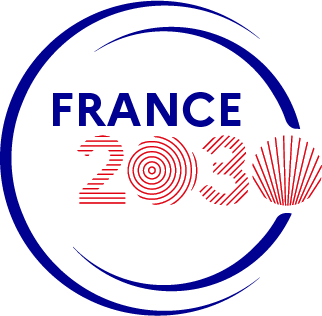04 | 05 | 2024
UPPA, CNRS and TotalEnergies win first industrial chair in social sciences co-financed by the French National Research Agency

Christine Bouisset, Deputy Director of the TREE laboratory, CNRS/UPPA, Ilias Iliopoulos, President of the Industrial Chairs Committee, ANR, Marie-France Bénassy, Head of the R&D Safety Environment and Sustainable Development Program, TotalEnergies, Christophe Derail, Vice-President Partnership and Innovation, UPPA, representing President Laurent Bordes, Younis Hermès, Aquitaine Regional Delegate, CNRS, Xavier Arnauld de Sartre, Director of the TREE laboratory, CNRS/UPPA.
The official launch of the “Renewable Energy Age: Social Notices” (REASONS) industrial research chair took place on Thursday April 4, 2024, on the Pau campus. This collaboration between the Transitions énergétiques et environnementales (TREE) laboratory, joint research unit between University of Pau and Pays de l’Adour and CNRS National Scientific Research Center, and TotalEnergies OneTech R&D Social Performance, is supported by the Agence nationale de la recherche (ANR), with total funding of 1 million euros over 4 years.
Led by Xavier Arnauld de Sartre, CNRS research director and head of the TREE laboratory, the REASONS industrial chair aims to analyze the debates surrounding the energy transition. It will explore the factors likely to encourage social acceptance, as well as rejection, of different types of renewable energies.
The Chair will study specific projects, as well as the industrial sectors and countries in which these renewable energies are being developed, with the aim of identifying and understanding, through their analysis, the implicit norms that the debates bring to light.
A scientific study will focus on how social organizations have positioned themselves in relation to transition technologies, with an in-depth analysis of two dimensions: on the one hand, how these organizations attack companies that make false promises, thus renewing accusations of greenwashing, and, on the other, how debates are structured, particularly on social media.
This study, together with analyses of the literature on social opposition to transitions, will provide elements for eight case studies on transition technologies, in order to establish a comparison of debates around energy transitions from a sustainable development perspective.
These elements will help to achieve the scientific (analysis of the rules of civic epistemology currently being developed) and operational (recommendations to the company for the deployment of its technologies) objectives of the industrial chair.
Finally, part of the Chair will be devoted to scientific communication and popularization, including the creation of a comic strip on the deployment of renewable energies, in line with the “Science with and for Society” (SAPS) label obtained by the University of Pau and Pays de l’Adour.
Taking account of society’s expectations and adopting a multidisciplinary approach
With this Chair, TotalEnergies, a multi-energy company, aims to understand how society and social players perceive all the mechanisms that enable the energy transition, in order to propose solutions that take account of the population’s expectations.
The University of Pau and Pays de l’Adour specializes in energy and environmental transitions, and TREE is the social science laboratory responsible for analyzing these transitions.
For the CNRS, the REASONS industrial chair illustrates the need to adopt a multi-disciplinary approach to societal challenges, with a growing emphasis on the human and social sciences.
Finally, for the ANR, REASONS, the first industrial chair in the human and social sciences, is perfectly in line with the objectives of the Industrial Chairs program supported by the Agency, by tackling the crucial theme of energy and environmental transitions. It will also benefit from the framework of excellence offered by UPPA’s I-SITE E2S (Energy and Environnement Solutions).
The National Research Agency (ANR) Industrial Chairs program
The aim of the Industrial Chairs program is to increase R&D investment by the private sector and public-sector players in the development of innovative products and processes. It also contributes, through training through industrial research, to increasing the employability of highly qualified personnel trained in a dual laboratory and business culture.
Since 2012, the ANR has co-funded 62 industrial chairs, selected for their scientific quality by a committee of independent experts. The industrial chair is co-financed in equal parts by the ANR (average contribution of 889,000 euros, maximum of 1.2 million euros, paid to the academic partner) and by the partner company or companies. Projects last 48 months.
The program is subject to one dedicated call for projects per year, and is open to all research themes.

